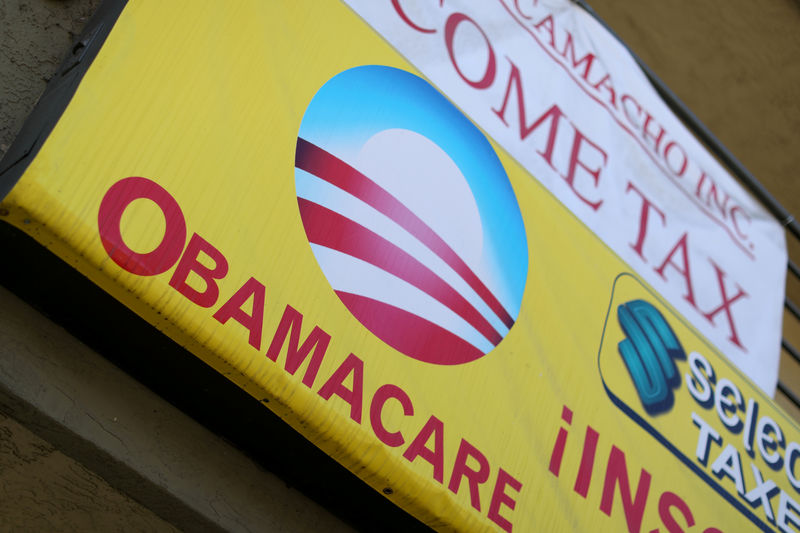By Susan Cornwell
WASHINGTON (Reuters) - U.S. President Donald Trump pledged on Wednesday to deliver a better healthcare system than Obamacare if the Supreme Court tosses out his predecessor's signature domestic achievement, a potentially hazardous claim as he seeks re-election.
Trump defended his administration's decision to step up its assault on the healthcare law passed under former President Barack Obama, which expanded healthcare coverage to about 20 million Americans.
"Obamacare is a disaster. It's too expensive by far," Trump told reporters in the Oval Office. "We're coming up with plans. ... And if the Supreme Court rules that Obamacare is out, we will have a plan that's far better than Obamacare."
The Justice Department on Monday asked the 5th Circuit Court of Appeals to overturn Obamacare, as the 2010 Affordable Care Act that overhauled the U.S. healthcare system is popularly known. Justice said it backed a federal judge's ruling in December that the Affordable Care Act violated the U.S. Constitution because it required people to buy health insurance.
Trump had repeatedly called for the replacement of Obamacare during his 2016 presidential campaign. In a tweet in October 2016, he said, "We will have MUCH less expensive and MUCH better healthcare."
After he entered the White House in January 2017, Trump urged his fellow Republicans to repeal Obamacare, something that they tried and failed repeatedly to do. Republicans have never been able to agree on a replacement plan.
Trump predicted on Tuesday that would change, saying Republicans "will soon be known as the party of healthcare."
Top Democrats pounced on the administration's move, saying their success in winning control of the House of Representatives in the mid-term elections in November showed Americans want them to protect Obamacare against repeated Republican attacks.
Believing the healthcare issue can help them defeat Trump's re-election bid next year, House Democrats unveiled a new proposal on Tuesday that would expand the Affordable Care Act.
NO RUSH BY REPUBLICANS
"If the Republican Party wants to be, in Donald Trump's words, the party of healthcare, God help the middle class," Senate Democratic leader Chuck Schumer said on Wednesday on the Senate floor. The elimination of Obamacare would send health insurance premiums soaring and revoke coverage for tens of millions of people, he said.
Health insurance has been a rallying cry for Democrats who have launched presidential bids for 2020, though there are differences in what they propose. The "Medicare-for-all" approach first championed by Senator Bernie Sanders is now also embraced by several other contenders for the Democratic nomination.
Republicans in Congress seemed to be in no rush to re-engage on the healthcare issue.
Senator John Thune, the No. 2 two Republican in the Senate, told reporters on Wednesday that if there is a path forward on healthcare legislation, he assumed the Trump administration would be involved in the process.
"We’ll see what he puts forward and his team,” Thune said.
Republican Senator Charles Grassley said, "We would have to act accordingly" if the Supreme Court dismantles Obamacare, but he noted there might not be any definitive court action until next year. And he doubted there would be a push for major healthcare legislation in a presidential election year.
Trump won a political victory over the weekend when Special Counsel Robert Mueller said his 22-month probe of Russian interference in the 2016 presidential election had found no evidence that Trump's campaign team colluded with Moscow.
But Democrats say a new Republican push to end Obamacare could quickly overshadow that victory.
Obamacare survived a 2012 legal challenge at the Supreme Court when a majority of justices ruled the "individual mandate," which requires individuals to buy insurance or pay a penalty, was a tax that Congress had the authority to impose.
In December, U.S. District Judge Reed O’Connor in Fort Worth, Texas, ruled the individual mandate could no longer be considered constitutional after Trump signed the $1.5 trillion tax cut package passed by Congress that eliminated the penalties.
Obamacare's supporters point out that in addition to expanding healthcare coverage to millions of Americans, it has made it more affordable for many via subsidized coverage, and prevented insurance companies from denying coverage for pre-existing conditions.

Critics view the law as a costly government intrusion into the private marketplace, and complain of high deductibles and premiums that price out some middle-income people who do not get subsidized coverage.